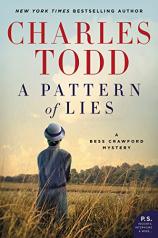Excerpt
Excerpt
A Pattern of Lies: A Bess Crawford Mystery

Chapter 1
Canterbury, Kent, Autumn 1918
I didn’t know much about the little town of Cranbourne, on The Swale in northeastern Kent, only that its abbey had been destroyed by a very angry Henry VIII when the abbot of the day refused to take the King’s side in certain matters. What stone was left had been transported to France to shore up the English-owned harbor in Calais. A young Lieutenant by the name of Merrill, standing by me at the railing of the Sea Maid, had told me about that as we came through the roads and edged toward where we were to dock. That was in 1915. Shortly after that, we were caught up in the rush of disembarking and finding our respective transports, and I doubt I gave it another thought. My next encounter with Cranbourne was while I was assigned to a base hospital in France. A critically ill patient was brought in for further surgery, and he sometimes talked about the village during his long and painful recovery. All in the past, that. And then yesterday I accompanied a convoy of badly wounded men to hospital in a village just outside Canterbury, in Kent. The hospital specialized in internal wounds, and it was a shorter journey to go directly there than to travel all the way to London first, and then arrange transport all the way back. They’d made the crossing from France safely, every one of my patients, even though Matron had been worried about the gravest cases. All the same, I was relieved to find a line of ambulances waiting for us in Dover, and again when the train pulled into Canterbury’s railway station. Soon after that we had every man in a cot with a minimum of fuss. Most of them were too exhausted to speak, but they knew they were in England, and their smiles were enough. Home. Alive. And on the way to recovery. I hoped it was true. Then I saw Lieutenant Harriman, the most seriously wounded, weakly giving me a thumbs- up, and I thought, Yes, they’ll be all right now!
By three in the morning, we’d coaxed them to swallow a little thin broth before wearily seeking our own beds, leaving the night staff in charge at last. Late the next morning, I said good- bye to the men and to the nurses who had come over with me. They were needed in France, but I had earned a few days of leave.
One of the doctors kindly ran me back into Canterbury to await my train to London. I was happily counting the minutes before I could call my parents in Somerset and tell them when to expect me in Victoria Station when I discovered that my train was delayed. Three hours, the stationmaster informed me, although from his gloomy expression, I didn’t hold out much hope of reaching London until midnight at the earliest. Well, so much for that, I thought, resigned to further delays. My telephone call would have to wait until I knew more.
Rather than sit in the busy, noisy railway station, I decided to walk for a bit. It was a fi ne day, and I’d always enjoyed Canterbury. Leaving my kit bag in the growing pile of luggage pushed to one side for the London train, I looked at my watch to check the time, then set out. A handsome town with its bustling markets and its famous cathedral, the one always associated with the tomb of the Black Prince and the martyrdom of Thomas à Becket, Canterbury had much to offer. I could pass a pleasant hour or two exploring, and then call in again at the station for the latest news. If the train was still delayed, I could count on a quiet lunch somewhere nearby, and even browse in the shops, although many of them had very little to offer these days. Before very long, I came across a hidden gem of a garden open to strollers. Half an hour spent enjoying the autumn flowers blooming along a narrow stream was heavenly. There was so little left of beauty in the parts of France I saw every day, only the hardy poppies and a few wildflowers that straggled in any patch of rough ground. I badly needed something else to think about besides torn bodies and bloody bandages, consoling amputees and long vigils at the sides of dying men. Sitting on one of the benches, I closed my eyes and listened to the bees in the blossoms at my feet.
A Pattern of Lies: A Bess Crawford Mystery
- Genres: Fiction, Historical Fiction, Historical Mystery, Mystery
- paperback: 352 pages
- Publisher: William Morrow Paperbacks
- ISBN-10: 0062386255
- ISBN-13: 9780062386250








